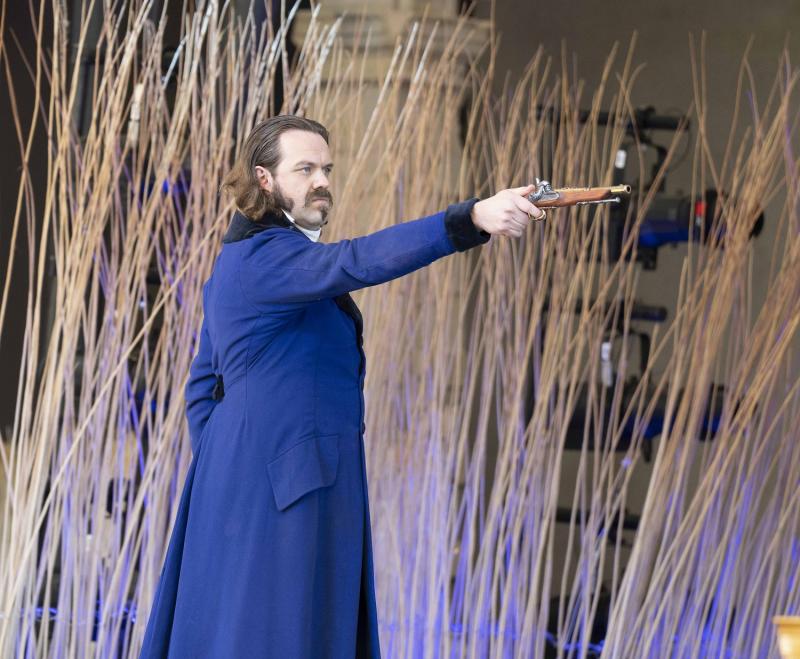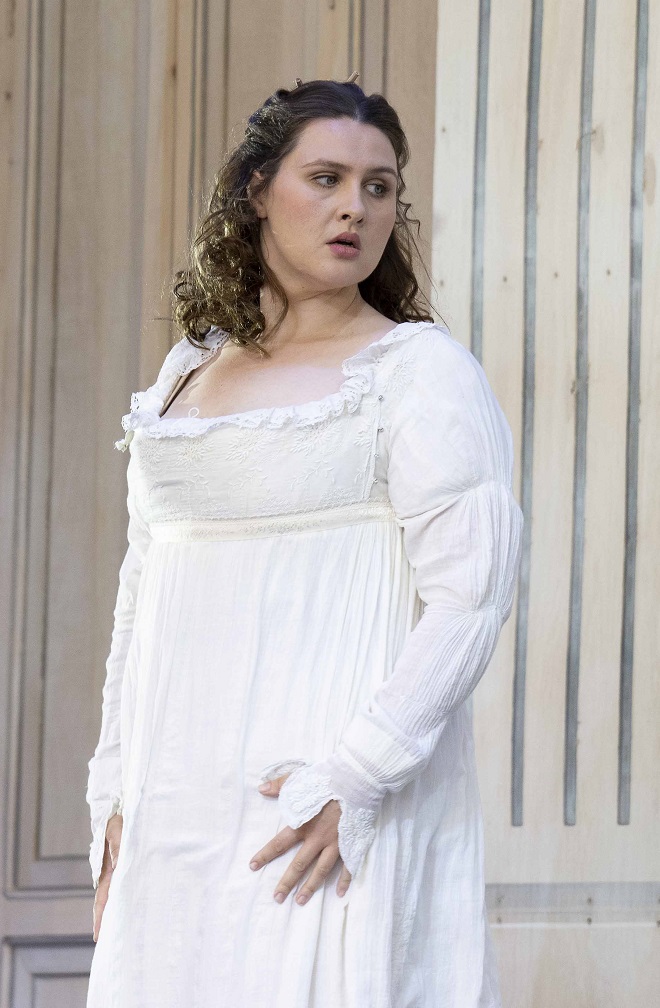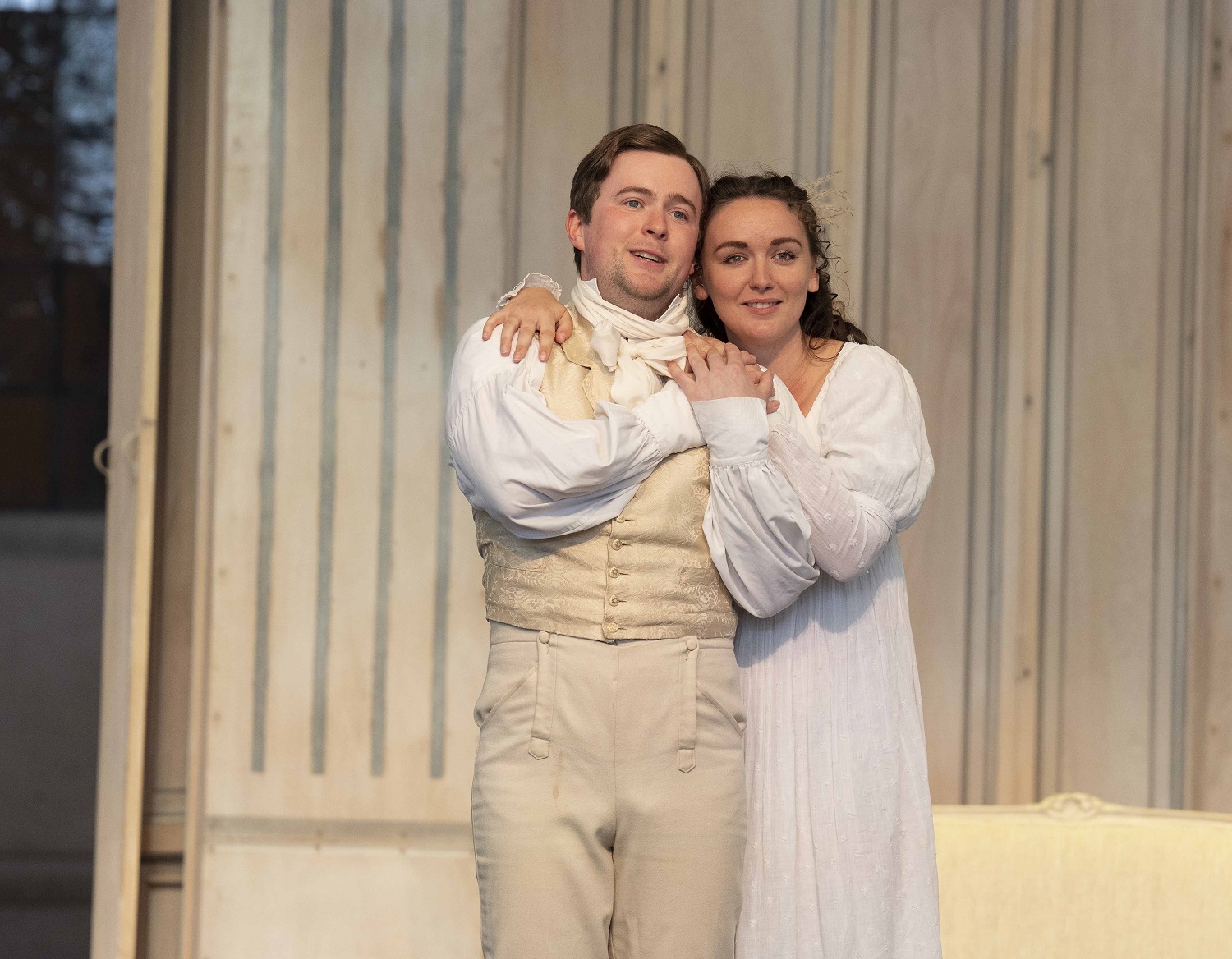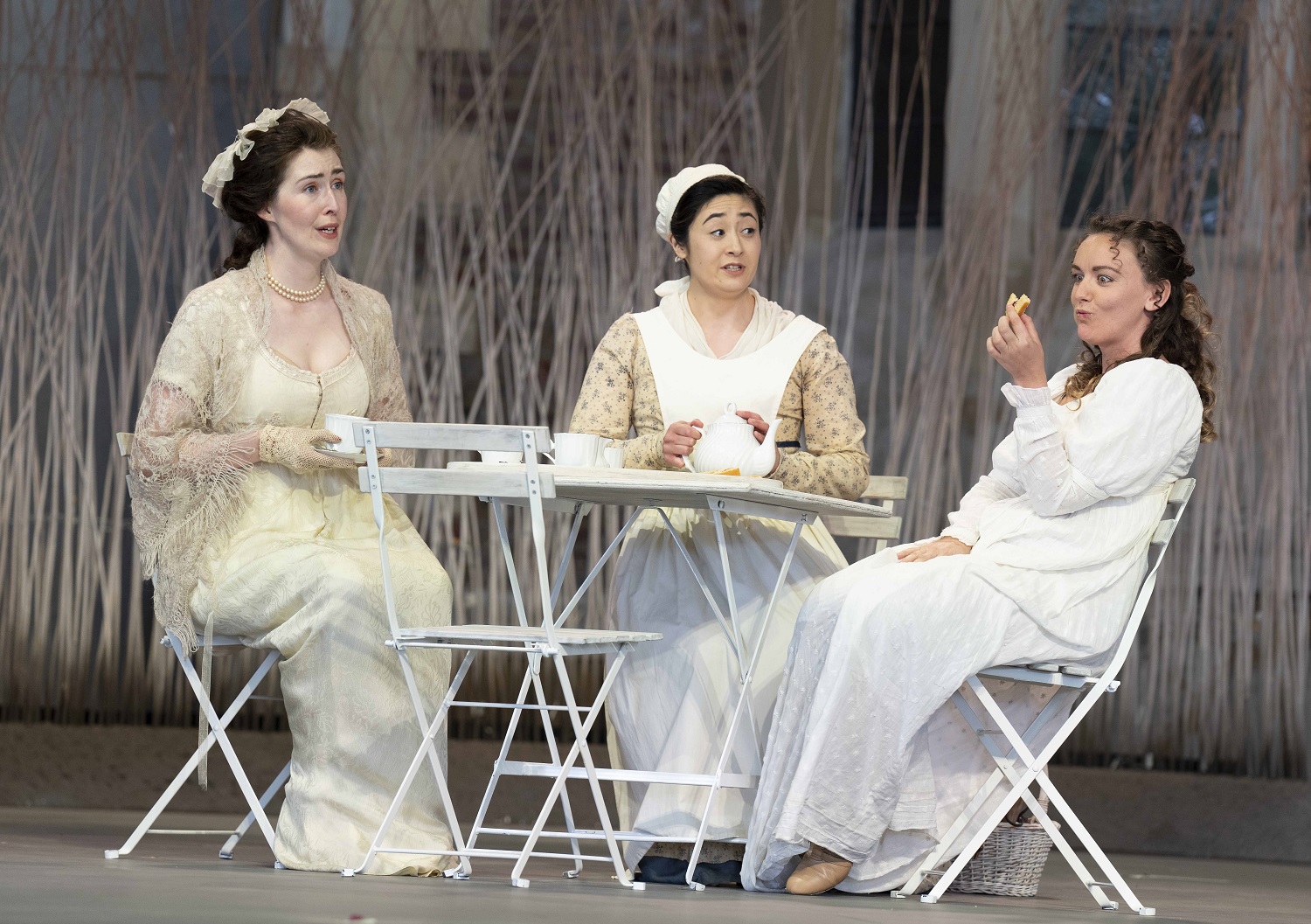Eugene Onegin, Opera Holland Park Young Artists review - intimacy and reflection | reviews, news & interviews
Eugene Onegin, Opera Holland Park Young Artists review - intimacy and reflection
Eugene Onegin, Opera Holland Park Young Artists review - intimacy and reflection
Fresh cast excels in Tchaikovsky’s tale of passion and honour

Sitting in a huge marquee on a June evening, with the sun peeking through every gap in the canopy, it is quite a stretch to imagine yourself in the remote countryside of rural Russia. But this new production of Eugene Onegin manages that, and with a minimum of means.
This performance was the first from the Young Artists team at Holland Park. The main cast premiered the show on 31 May, but two performances and two school matinees, are being given by this completely separate line-up, with its own cast, director and conductor. The aim is artist development, and it is an impressive programme, now into its second decade. Among Holland Park’s main productions this year, 17 artists are alumni of the scheme.
 The production has already received rave reviews, which I am happy to amplify. The set, designed by one “takis”, is very simple: two angled walls that can be moved to various positions around the back of the stage. Tall doors open in the panels, transforming these into series of pillars, and a palace interior becomes a colonnaded garden. Some rushes around the back of the stage suggest a rural setting. That’s about it. Everything else is achieved through lighting effects (designer Robert Price), which are used to impressively psychological effect, drawing the audience into Onegin’s mind as events conspire against him.
The production has already received rave reviews, which I am happy to amplify. The set, designed by one “takis”, is very simple: two angled walls that can be moved to various positions around the back of the stage. Tall doors open in the panels, transforming these into series of pillars, and a palace interior becomes a colonnaded garden. Some rushes around the back of the stage suggest a rural setting. That’s about it. Everything else is achieved through lighting effects (designer Robert Price), which are used to impressively psychological effect, drawing the audience into Onegin’s mind as events conspire against him.
The show is directed by Julia Burbach, but the Young Artists version by Emma Black. Presumably that the overall concept came from Burbach, but the details of the Personenregie are down to Black. If so, equal credit is deserved. The minimal stage concept means that the drama is particularly dependent on compelling and dramatic performances, and for the most part, that is exactly what we get.
Young singers always make for more believable casting, at least for romantic leads. As Tatyana and Onegin, Lucy Anderson (pictured above left) and Rory Musgrave are impressively credible.. Anderson has a complex, vibrato-rich tone. It is more satisfying in the mid-register than the top, but the part makes few demands of the high range. Musgrave complements her sound with an equally sophisticated and burnished tone. A lack of power is all that separates these singers from their older colleagues; their tone and artistry are already secure.
Smart vocal casting links Tatyana with Onegin and Olga with Lensky. Unlike the main couple, the Olga and Lensky of Anna Elizabeth Cooper and Jack Roberts (pictured below) both have a clear and direct vocal style. Cooper in particularly stands out, even from this fine cast, for her vocal agility and supple, clear phrasing. Jack Roberts has an old-fashioned matinee-idol tenor, or he puts one on for Lensky. That proves ideal to project the character’s stubbornness and jealousy.  The Holland Park stage has a lowered gangway around the front of the pit, which the production uses effectively. The ensembles in the first act risk congestion, which the directors avoid by placing several of the characters out at the front. But it is only ever the leads that sing from here. The comprimario roles remain upstage, only background to the psychological drama. Even so, they are all well cast. More imagination is required to fit the young singers into these older roles, particularly the Larina of Emily Hodkinson and Filippyevna of Jane Monari (pictured below, from left). But, beyond subtle costuming, the production makes no excuses for the singers’ youth, and vocally all are impressive. Russian pronunciation is a particular strength of this cast, especially in the supporting roles. That speaks of careful preparation from all the singers.
The Holland Park stage has a lowered gangway around the front of the pit, which the production uses effectively. The ensembles in the first act risk congestion, which the directors avoid by placing several of the characters out at the front. But it is only ever the leads that sing from here. The comprimario roles remain upstage, only background to the psychological drama. Even so, they are all well cast. More imagination is required to fit the young singers into these older roles, particularly the Larina of Emily Hodkinson and Filippyevna of Jane Monari (pictured below, from left). But, beyond subtle costuming, the production makes no excuses for the singers’ youth, and vocally all are impressive. Russian pronunciation is a particular strength of this cast, especially in the supporting roles. That speaks of careful preparation from all the singers.
The directors take a few dramatic liberties to convey the psychological drama, mostly involving mute characters appearing as apparitions. In the Letter Scene, Onegin appears, and Tatyana addresses him directly as she writes. In the introduction to the duel scene, Lensky appears to Onegin as a kindred spirit, before departing and returning again as a foe. The ghost of Lensky also haunts Onegin at the ball in Gremin’s palace. That works well, although the idea is taken too far when the whole of the Polonaise is transformed into a nightmare sequence, with Onegin imagining himself gunning down the entire cast. As Gremin, Henry Grant Kerswell has a suitably world-weary tone (despite his youth). Little effort is made to distinguish Gremin’s palace from the previous settings, beyond smarter costumes, and the production does little with the final scenes, or with Gremin himself. Musically, this performance got off to a shaky start: wayward tuning from the strings and foursquare phrasing bode ill. Fortunately, standards soon rose with the entry of the singers. The City of London Sinfonia appears here as a small pit orchestra, often having to overexert to sound like a large one, and the string tone often suffers. Some nice woodwind solos though, and an impressive showing from Tchaikovsky’s beloved bassoons. The solo cello of Rebecca Knight deserves particular mention, her solos bringing real intimacy and warmth. Conductor Hannah von Wiehler lacks imagination with the orchestral textures, but her guidance and handling of the singers is impressive. She is also particularly good at pacing the dramatic climaxes. And the Letter Scene was just gorgeous, a triumph for both her and Lucy Anderson. Like the orchestra, the Holland Park Chorus is small but punches above its weight.
Musically, this performance got off to a shaky start: wayward tuning from the strings and foursquare phrasing bode ill. Fortunately, standards soon rose with the entry of the singers. The City of London Sinfonia appears here as a small pit orchestra, often having to overexert to sound like a large one, and the string tone often suffers. Some nice woodwind solos though, and an impressive showing from Tchaikovsky’s beloved bassoons. The solo cello of Rebecca Knight deserves particular mention, her solos bringing real intimacy and warmth. Conductor Hannah von Wiehler lacks imagination with the orchestral textures, but her guidance and handling of the singers is impressive. She is also particularly good at pacing the dramatic climaxes. And the Letter Scene was just gorgeous, a triumph for both her and Lucy Anderson. Like the orchestra, the Holland Park Chorus is small but punches above its weight.
Like all Russian opera, Onegin is typically associated with big, mature voices and deep, rich musical textures. The Young Artists version at Holland Park presents it differently, with more intimacy and more reflection. It is an impressive showcase for emerging talent, so look out for all of the names above at Holland Park, and further abroad, in years to come.
- Eugene Onegin runs to 25 June at Opera Holland Park. Another Young Artists Performance will take place 23 June.
- More opera reviews on theartsdesk
rating
Explore topics
Share this article
The future of Arts Journalism
You can stop theartsdesk.com closing!
We urgently need financing to survive. Our fundraising drive has thus far raised £49,000 but we need to reach £100,000 or we will be forced to close. Please contribute here: https://gofund.me/c3f6033d
And if you can forward this information to anyone who might assist, we’d be grateful.

Subscribe to theartsdesk.com
Thank you for continuing to read our work on theartsdesk.com. For unlimited access to every article in its entirety, including our archive of more than 15,000 pieces, we're asking for £5 per month or £40 per year. We feel it's a very good deal, and hope you do too.
To take a subscription now simply click here.
And if you're looking for that extra gift for a friend or family member, why not treat them to a theartsdesk.com gift subscription?
more Opera
 Cinderella/La Cenerentola, English National Opera review - the truth behind the tinsel
Appealing performances cut through hyperactive stagecraft
Cinderella/La Cenerentola, English National Opera review - the truth behind the tinsel
Appealing performances cut through hyperactive stagecraft
 Tosca, Royal Opera review - Ailyn Pérez steps in as the most vivid of divas
Jakub Hrůša’s multicoloured Puccini last night found a soprano to match
Tosca, Royal Opera review - Ailyn Pérez steps in as the most vivid of divas
Jakub Hrůša’s multicoloured Puccini last night found a soprano to match
 Tosca, Welsh National Opera review - a great company reduced to brilliance
The old warhorse made special by the basics
Tosca, Welsh National Opera review - a great company reduced to brilliance
The old warhorse made special by the basics
 BBC Proms: The Marriage of Figaro, Glyndebourne Festival review - merriment and menace
Strong Proms transfer for a robust and affecting show
BBC Proms: The Marriage of Figaro, Glyndebourne Festival review - merriment and menace
Strong Proms transfer for a robust and affecting show
 BBC Proms: Suor Angelica, LSO, Pappano review - earthly passion, heavenly grief
A Sister to remember blesses Puccini's convent tragedy
BBC Proms: Suor Angelica, LSO, Pappano review - earthly passion, heavenly grief
A Sister to remember blesses Puccini's convent tragedy
 Orpheus and Eurydice, Opera Queensland/SCO, Edinburgh International Festival 2025 review - dazzling, but distracting
Eye-popping acrobatics don’t always assist in Gluck’s quest for operatic truth
Orpheus and Eurydice, Opera Queensland/SCO, Edinburgh International Festival 2025 review - dazzling, but distracting
Eye-popping acrobatics don’t always assist in Gluck’s quest for operatic truth
 MARS, Irish National Opera review - silly space oddity with fun stretches
Cast, orchestra and production give Jennifer Walshe’s bold collage their all
MARS, Irish National Opera review - silly space oddity with fun stretches
Cast, orchestra and production give Jennifer Walshe’s bold collage their all
 Káťa Kabanová, Glyndebourne review - emotional concentration in a salle modulable
Janáček superbly done through or in spite of the symbolism
Káťa Kabanová, Glyndebourne review - emotional concentration in a salle modulable
Janáček superbly done through or in spite of the symbolism
 Buxton International Festival 2025 review - a lavish offering of smaller-scale work
Allison Cook stands out in a fascinating integrated double bill of Bernstein and Poulenc
Buxton International Festival 2025 review - a lavish offering of smaller-scale work
Allison Cook stands out in a fascinating integrated double bill of Bernstein and Poulenc
 Tosca, Clonter Opera review - beauty and integrity in miniature
Happy surprises and a convincing interpretation of Puccini for today
Tosca, Clonter Opera review - beauty and integrity in miniature
Happy surprises and a convincing interpretation of Puccini for today
 Hamlet, Buxton International Festival review - how to re-imagine re-imagined Shakespeare
Music comes first in very 19th century, very Romantic, very French operatic creation
Hamlet, Buxton International Festival review - how to re-imagine re-imagined Shakespeare
Music comes first in very 19th century, very Romantic, very French operatic creation
 Falstaff, Glyndebourne review - knockabout and nostalgia in postwar Windsor
A fat knight to remember, and snappy stagecraft, overcome some tedious waits
Falstaff, Glyndebourne review - knockabout and nostalgia in postwar Windsor
A fat knight to remember, and snappy stagecraft, overcome some tedious waits

Add comment